Dispute Arises As Woman Claims Forewarning Absolves Her Of Her Cat's Actions
Living with someone else can be tricky, especially when pets and expensive items like laptops are involved. Here's a story about two roommates, a cat, and a $500 problem that shows just how complicated things can get.
OP, a 25-year-old woman, had a new roommate, a 23-year-old woman, move in with her and her boyfriend. Everything was going pretty well, except for one thing: the new roommate kept taking the cat into her room and shutting the door, keeping the cat with her for a long time. At first, OP didn't like this.
It felt weird because they didn't know each other well, and it seemed like the roommate was trying to make the cat hers. But as they got to know each other better, she let it go.
There was another issue, though. The cat liked to chew on the corners of laptops. The owner had told her roommate about this a few times because the cat had already nibbled on her laptop once, but it didn't do much harm.
Then, one day, the roommate said she had to go to the Apple Store because the cat had chewed her laptop screen, and it would cost $500 to fix. She wanted the cat's owner, OP, to pay half of that. But OP thought it wasn't fair to pay since the roommate kept letting the cat into her room and didn't watch him.
OP's roommate moved in with OP and her boyfriend, and nine months ago, they got along well, but she started taking OP's cat into her room without asking.

OP's cat has a habit of biting laptop corners, and OP has cautioned her roommate about this multiple times.

OP's cat damaged her roommate's laptop, and she wants to split the cost, but she let the cat be in her room unsupervised.

The Psychology of Pet Ownership and Responsibility
Dr. Laura Simmons, a clinical psychologist at UCLA, highlights that pet ownership often brings joy, but it also comes with significant responsibilities that owners might overlook.
In this case, the individual’s attempt to absolve themselves of responsibility by blaming their cat reflects a deeper psychological conflict regarding accountability.
Research indicates that pet behavior can sometimes be misattributed to their owners’ stress levels and emotional states, emphasizing the link between human emotions and animal behavior.
OP should remind her of her previous warnings.

She mistreats OP's cat and will face consequences for the cat's actions.

OP should restrict her cat's access to her roommate's room and only allow the cat in shared areas where they can supervise.
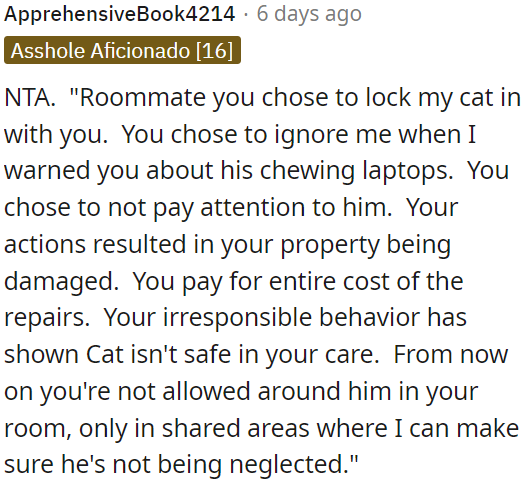
This scenario brings to light the concept of displacement, where humans transfer their feelings of frustration onto their pets, blaming them for issues that may arise in their lives.
Studies in animal behavior psychology show that understanding pet dynamics can help owners take more responsibility for ensuring their pets are well-trained and cared for.
By doing so, owners can foster a healthier pet-owner relationship and mitigate potential behavioral issues.
She was warned about the cat's habits.
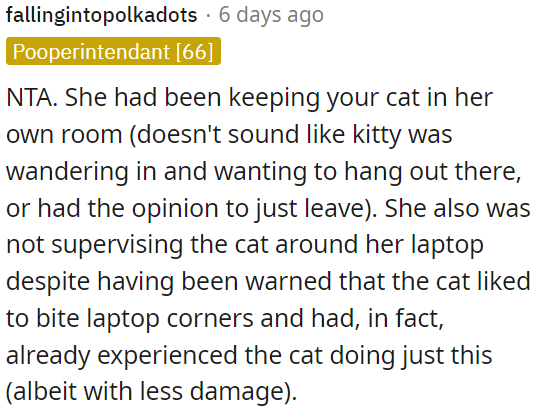
She was aware of the possibility and allowed the cat into her room.
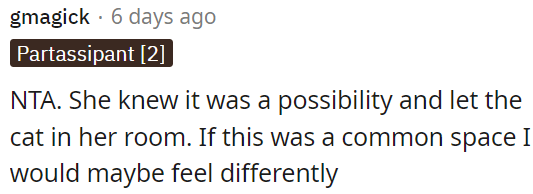
The situation could have been easily avoided since she was aware of the cat's quirk and didn't take precautions.
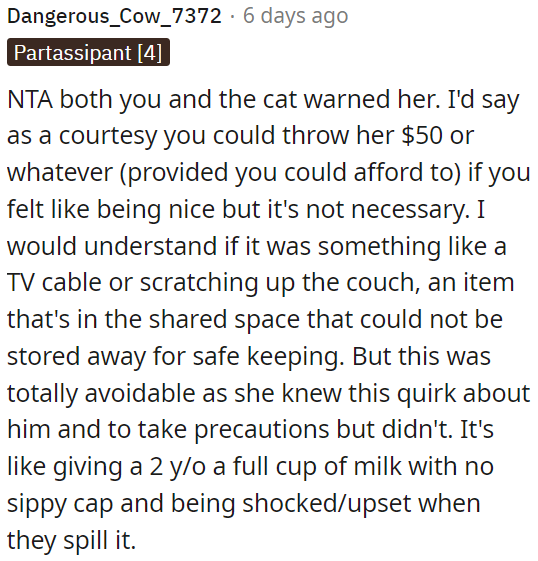
Shifting Perspectives on Pet Behavior
Understanding the reasons behind a pet's behavior is crucial for effective pet ownership.
Behavioral studies show that many issues stem from inadequate training or environmental stressors rather than the pet's inherent nature.
When owners take responsibility for their pets' actions, it can greatly enhance both the owner’s and the pet's emotional well-being.
This was a clear warning, and the responsibility lies with the roommate, not the cat or OP.
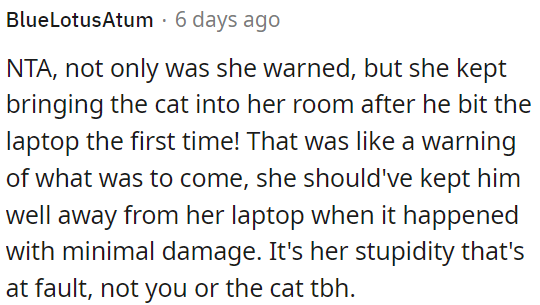
OP's roommate didn't like the high price at the Apple Store, so she blamed OP.
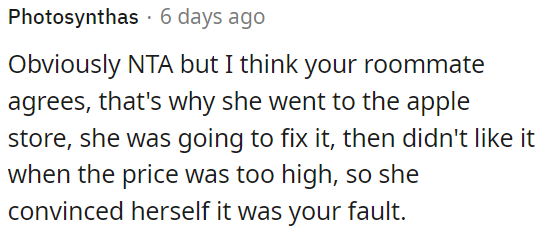
Leaving the cat alone with the laptop was not a wise decision.
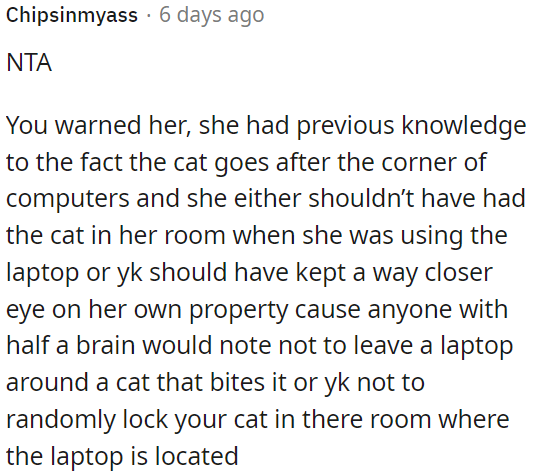
To address these challenges effectively, owners should engage in training programs that focus on behavior management and communication with their pets.
Involving a professional animal trainer or behaviorist can provide valuable insights into modifying undesirable behaviors.
Moreover, understanding the psychological needs of pets can strengthen the bond between owner and pet, leading to a more harmonious relationship.
In simple terms, OP should remind her roommate that she had warned her about the cat's behavior before. The roommate allowed the cat into her room, knowing it could chew on things, so she should take responsibility for what happened.
It's not fair to blame OP for the laptop damage when she didn't watch her laptop around the cat. To avoid such problems, OP should keep the cat out of the roommate's room and only let it stay in common areas where they can keep an eye on it.
The Importance of Accountability in Pet Ownership
Pet ownership is a significant commitment that requires consistent emotional and practical investment from the owner.
Research emphasizes that taking responsibility for a pet's actions is essential for fostering a positive environment for both the pet and the owner.
Ultimately, embracing accountability can lead to healthier relationships and happier pets.
Psychological Analysis
This situation underscores the importance of accountability in pet ownership, as blaming an animal for their behavior can indicate deeper issues regarding responsibility.
Recognizing that pets often reflect their owners’ emotional states can help owners engage more positively in their relationships with their pets.
Analysis generated by AI
Analysis & Alternative Approaches
Pet ownership comes with unique emotional challenges and responsibilities that must be recognized for a successful relationship.
Understanding the dynamics of pet behavior and ownership can lead to healthier interactions and emotional fulfillment.
Ultimately, embracing accountability and actively engaging in proper training fosters a positive environment for both pets and their owners.



